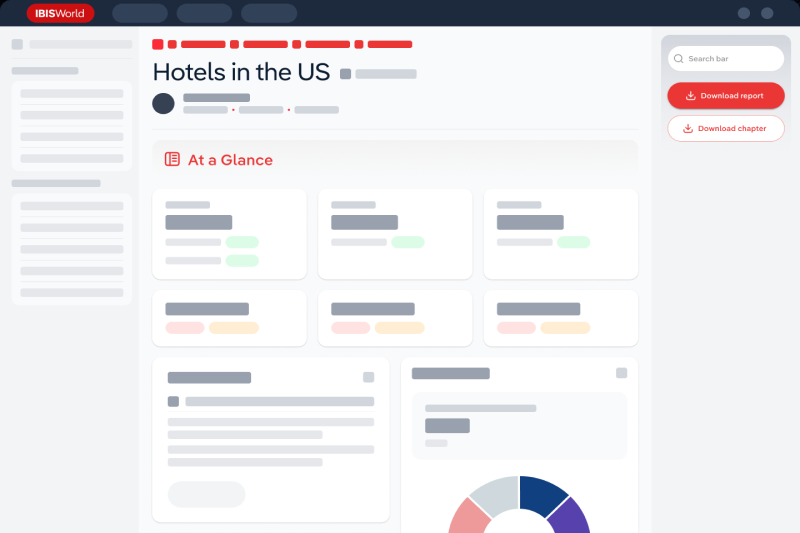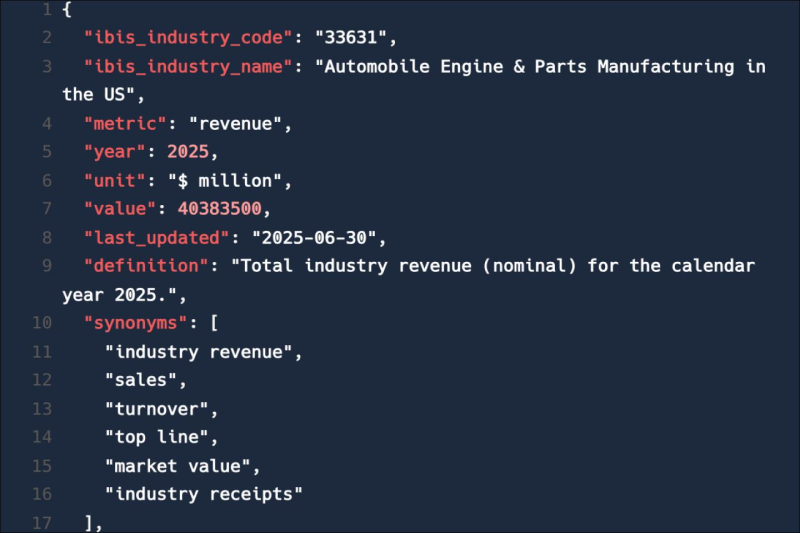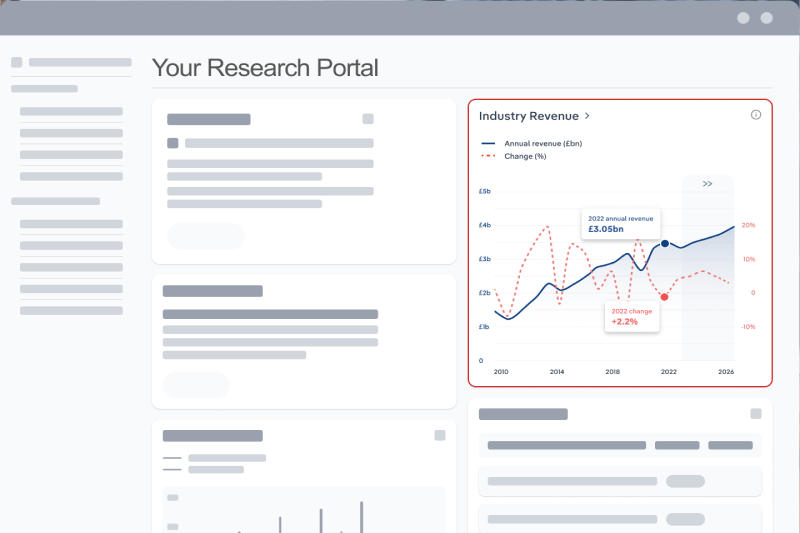IBISWorld Platform
Answer any industry question in minutes with our entire database at your fingertips.

On a global scale, the Television Programming and Broadcasting industry in the Republic of Ireland is small. In Ireland, there are three income-generating national broadcasters that are licensed by the Broadcasting Authority of Ireland. These are public service broadcasters Raidio Teilifis Eireann and Teilifis na Gaeilge and commercial broadcaster Virgin Media Television. Both commercial broadcasters and public service broadcasters rely heavily on advertising income, which has been weak over the past few years. The industry comprises a preponderance of community TV broadcasters, operating as not-for-profit broadcasters that are, predominantly, bankrolled by sponsorship and provide cultural and heritage programming.

Answer any industry question in minutes with our entire database at your fingertips.

Feed trusted, human-driven industry intelligence straight into your platform.

Streamline your workflow with IBISWorld’s intelligence built into your toolkit.
IBISWorld's research coverage on the Television Programming & Broadcasting industry in Ireland includes market sizing, forecasting, data and analysis from 2015-2030. The most recent publication was released July 2025.
The Television Programming & Broadcasting industry in Ireland operates under the SIC industry code J60.200IE. Companies in the Television Programming and Broadcasting industry acquire and schedule programming content, which is subsequently broadcast to audiences via TV transmission networks. The broadcast of programming made freely available to users, in addition to programming available only on a subscription basis, falls under the scope of industry activities. The production and distribution of TV programming content are activities that are excluded from the industry. Related terms covered in the Television Programming & Broadcasting industry in Ireland include multichannel multipoint distribution service (mmds, digital terrestrial television (dtt), free-to-air (fta), internet protocol television (iptv) and spot advertising.
Products and services covered in Television Programming & Broadcasting industry in Ireland include Public-service programming and broadcasting and Commercial programming and broadcasting.
Companies covered in the Television Programming & Broadcasting industry in Ireland include Raidio Teilifis Eireann, Virgin Media Ireland Ltd and Teilifis Na Gaeilge.
The Performance chapter covers detailed analysis, datasets, detailed current performance, sources of volatility and an outlook with forecasts for the Television Programming & Broadcasting industry in Ireland.
Questions answered in this chapter include what's driving current industry performance, what influences industry volatility, how do successful businesses overcome volatility, what's driving the industry outlook. This analysis is supported with data and statistics on industry revenues, costs, profits, businesses and employees.
The Products and Markets chapter covers detailed products and service segmentation and analysis of major markets for the for the Television Programming & Broadcasting industry in Ireland.
Questions answered in this chapter include how are the industry's products and services performing, what are innovations in industry products and services, what products or services do successful businesses offer and what's influencing demand from the industry's markets. This includes data and statistics on industry revenues by product and service segmentation and major markets.
The Geographic Breakdown chapter covers detailed analysis and datasets on regional performance of the Television Programming & Broadcasting industry in Ireland.
Questions answered in this chapter include where are industry businesses located and how do businesses use location to their advantage. This includes data and statistics on industry revenues by location.
The Competitive Forces chapter covers the concentration, barriers to entry and supplier and buyer profiles in the Television Programming & Broadcasting industry in Ireland. This includes data and statistics on industry market share concentration, barriers to entry, substitute products and buyer & supplier power.
Questions answered in this chapter include what impacts the industry's market share concentration, how do successful businesses handle concentration, what challenges do potential industry entrants face, how can potential entrants overcome barriers to entry, what are substitutes for industry services, how do successful businesses compete with substitutes and what power do buyers and suppliers have over the industry and how do successful businesses manage buyer & supplier power.
The Companies chapter covers Key Takeaways, Market Share and Companies in the Television Programming & Broadcasting industry in Ireland. This includes data and analysis on companies operating in the industry that hold a market share greater than 5%.
Questions answered in this chapter include what companies have a meaningful market share and how each company is performing.
The External Environment chapter covers Key Takeaways, External Drivers, Regulation & Policy and Assistance in the Television Programming & Broadcasting industry in Ireland. This includes data and statistics on factors impacting industry revenue such as economic indicators, regulation, policy and assistance programs.
Questions answered in this chapter include what demographic and macroeconomic factors impact the industry, what regulations impact the industry, what assistance is available to this industry.
The Financial Benchmarks chapter covers Key Takeaways, Cost Structure, Financial Ratios, Valuation Multiples and Key Ratios in the Television Programming & Broadcasting industry in Ireland. This includes financial data and statistics on industry performance including key cost inputs, profitability, key financial ratios and enterprise value multiples.
Questions answered in this chapter include what trends impact industry costs and how financial ratios have changed overtime.
The Industry Data chapter includes 10 years of historical data with 5 years of forecast data covering statistics like revenue, industry value add, establishments, enterprises, employment and wages in the Television Programming & Broadcasting industry in Ireland.
More than 6,000 businesses use IBISWorld to shape local and global economies
We were able to supplement our reports with IBISWorld’s information from both a qualitative and quantitative standpoint. All of our reporting now features some level of IBISWorld integration.

IBISWorld delivers the crisp business knowledge we need to drive our business. Whether it be serving up our major clients, winning new business or educating on industry issues, IBISWorld brings real value.

IBISWorld has revolutionised business information — which has proved commercially invaluable to exporters, investors and public policy professionals in Australia and overseas.

When you’re able to speak to clients and be knowledgeable about what they do and the state that they operate in, they’re going to trust you a lot more.

The market size of the Television Programming & Broadcasting industry in Ireland is €463.9m in 2026.
There are 174 businesses in the Television Programming & Broadcasting industry in Ireland, which has grown at a CAGR of 4.9 % between 2020 and 2025.
The Television Programming & Broadcasting industry in Ireland is unlikely to be materially impacted by import tariffs with imports accounting for a low share of industry revenue.
The Television Programming & Broadcasting industry in Ireland is unlikely to be materially impacted by export tariffs with exports accounting for a low share of industry revenue.
The market size of the Television Programming & Broadcasting industry in Ireland has been growing at a CAGR of 2.4 % between 2020 and 2025.
Over the next five years, the Television Programming & Broadcasting industry in Ireland is expected to grow.
The biggest companies operating in the Television Programming & Broadcasting industry in Ireland are Raidio Teilifis Eireann, Virgin Media Ireland Ltd and Teilifis Na Gaeilge
Digital free-to-air television and Digital subscription-based television are part of the Television Programming & Broadcasting industry in Ireland.
The company holding the most market share in the Television Programming & Broadcasting industry in Ireland is Raidio Teilifis Eireann.
The level of competition is moderate and increasing in the Television Programming & Broadcasting industry in Ireland.




